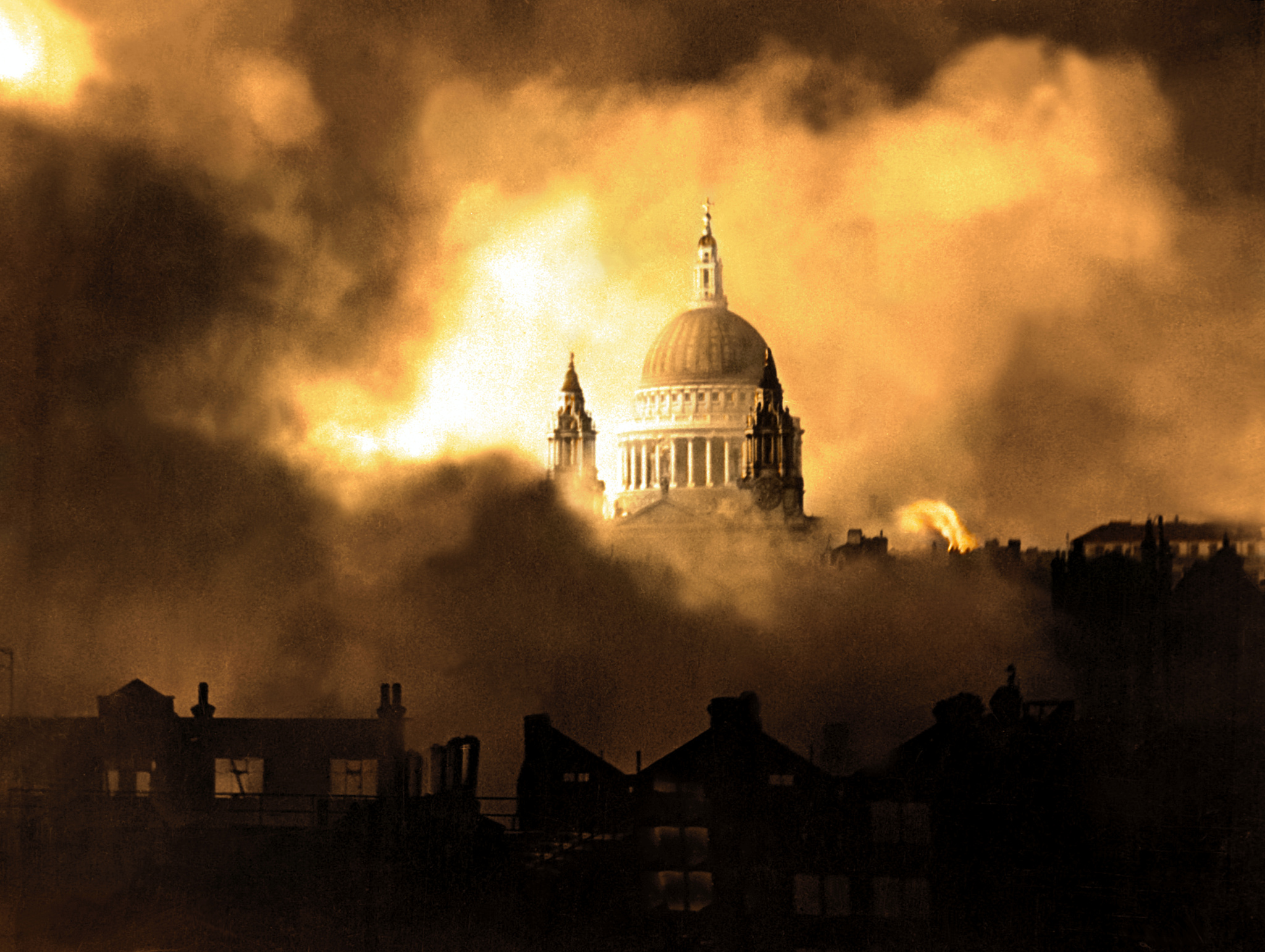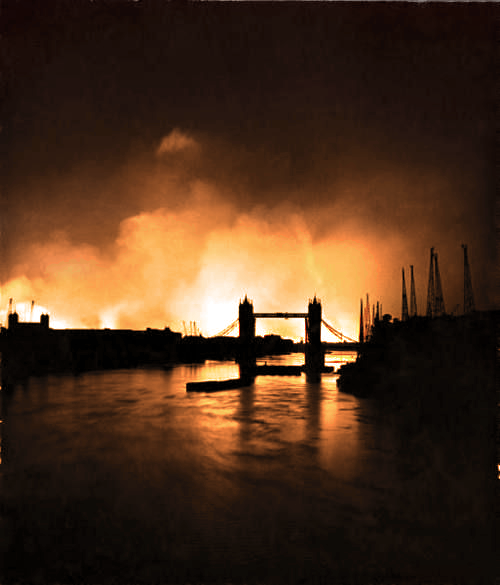The Pittsburgh Press (December 30, 1940)
LONDON ‘CITY’ SURVIVES FIRE OF BLITZ-RAID
….
Financial District Blasted For Hours by Hundreds Of Nazi Planes
….
By H. L. Percy, United Press Staff Writer
London, Dec. 30 (Transatlantic Telephone) –

London’s ancient “City,” one square mile of narrow crooked streets and historic buildings, emerged battered, smoke-begrimed and angry today from what the government charged was a deliberate German attempt to destroy it by fire without regard to military objectives.
For hours during the night, while President Roosevelt was declaring in Washington that Britain would win the war with America’s aid, hundreds of thousands of Londoners were fighting, in the “City,” the greatest fire in nearly 300 years.
Policemen, firemen, air raid wardens, soldiers, civilian volunteers, worked, seared by flames and blinded by smoke, to put our fires started by thousands of incendiary bombs which hundreds of German planes dropped for hours.
Nurses, Women, Children
Nurses played hoses over the roofs of hospitals.
Women and children fought the flames which ate into their homes.
Over the City spread a shroud of heavy smoke, through which great tongues of flame roared up.
But, as this dispatch was filed, all the fires were out or under control. Scores of buildings were in smoking ruins. But the City stands. The damage is great but it is not irremediable.
Prime Minister Winston Churchill and Mrs. Churchill toured the most heavily damaged areas in the city this afternoon, walking among piles of debris.
Cheered by Big Crowds
They were followed by a huge crowd of persons who cheered and waved their hats.
The Air and Home Security Ministries, in their angriest communiqué of the war, charged that the Germans, in a new form of ruthless warfare, had tried to burn a city in which there is no military objective.
The Ministries said:
Last night the enemy dropped a large number of incendiary bombs on the City of London in a deliberate attempt to set fire to it. Damage was done to many famous buildings including the Guildhall and several city churches.
St. Paul’s Endangered
St. Paul’s Cathedral itself was endangered, but the neighboring fires were extinguished in time.
There was nowhere any attempt to single out targets of military importance.
Fires were caused in other parts of the London area, where damage was done to commercial buildings.
The London fire services worked heroically and with success throughout the night.
Casualties were few.
That was the official story of a night in which Londoners fought great flames while fire rained down from the smoke blackened sky upon them, while the silence of cables to foreign countries and radio stations, told the world that this historic city was fighting for its life.
Say City’s Fight Won
When the cables and the wireless resumed service, after hours, it was to say that the city’s fight had been won.
There were fires all over the London area. But the German fury was concentrated in the one square mile of the city, the financial district and the ancient London which Queen Elizabeth and Henry VIII and others of England’s sovereigns knew and it was to that ancient area that the communiqué had reference in mentioning the “City” of London.
Communication with London was severed for about three hours, and for about five hours there was no real news of the raid. It was understood in New York that the cable companies were operating from emergency headquarters in the London suburbs.
It was not until well after dawn today that normal communication with the world was restored, and even then, the cable companies worked under difficulties.
Begin Soon After Dark
Air raid sirens shrieked throughout London a little after dark last night.
Almost at once there was a heavy rain of “bread basket” incendiary bombs – containers which open as they drop and lose up to 50 or 100 small incendiary bombs each.
Anti-aircraft guns began to fire.
In a few minutes the raid had reached intensive pitch. Only occasionally was there the “crump” of an explosive bomb.
The German planes criss-crossed the sky. Thousand upon thousand, the firebombs came down. Now the anti-aircraft guns, which had been firing sporadically, were firing all the time.
Reporters Go To Shelter
For the first time since September, when the mass destruction raids started, the United Press staff was compelled to go to its underground shelter to continue service there.
But long after great sheets of fire were thrusting their way from building to building and even street to street, buses continued to run – for once, despite the blackout, with all the light they needed, and even pedestrians stayed on the sidewalks. Throughout the raid, some knots of people stood, in imminent danger, in the city itself, watching the spectacle.
They heard the German planes going across the sky and the darting British night fighter patrols hunting them. They heard the burst of a machine gun occasionally as one of the British planes contacted a raider and the intensified roar of the German planes’s motor as it maneuvered away.
Reports began coming into newspaper and press association offices – a church on fire, a hospital roof in flames, its women workers running to the roof with hoses and buckets to fight the flames while patients were taken to safety below. A museum in flames.
Fire Engines Red Hot
Those in the streets saw the exhaust pipes of fire engines get red hot. The firemen could play their hoses on fire at some points, in any of the four directions.
It was all over in three hours, that is the bombing. The fight continued for hours afterward.
Firemen climbed over roofs, leaned out of windows, to fight incendiary bombs as they dropped. The “bread basket” bombs at times came so fast that they sounded almost like machine gun bullets. An incendiary bomb fell in the bucket one fireman was taking toward another bomb to put it out.
Under the streets, thousands of people waited silently in subway shelters, These were so crowded that many persons had to stand. Others sat on stairways.
Dead – Policeman, Horses
A policeman dropped dead at his post, flames all about him, when a bomb struck outside a hotel and dislodged masonry. An explosive bomb killed 80 horses in a brewery stable. Four hundred persons sheltering in the basement of a church were unhurt when an explosive bomb struck overhead.
As this dispatch is telephoned to New York, the fight is about over. The fires are out or smouldering. The blackened, seared firefighters are dropping asleep.
There are many stories of heroism, too many for one dispatch. When one church was hit, and its roof burst into flames, all those in the vicinity, men and boys, including many messenger boys on night duty, ran into the building, feeling in the dark through the smoke for church furnishings they could save. A lectern, an altar cloth, a reading table on which a Bible had lain yesterday noon, gold plate, communion vessels were brought out. There was a ripping sound. Those in the building ran to the street just before the roof crashed in.
One bomb put out all the lights in a big hotel. Tableware was swept to the floor of the dining room. The diners sat in silence. It seemed hardly a moment before waiters came in with candles, and dinner was resumed.
Taxies Into Bomb Crater
A naval officer said 15 incendiary bombs dropped just in front of him. He hailed a passing taxicab. It drove into a bomb crater and was smashed.
He said:
I walked on home. Just as I reached the door a high explosive burst about 10 yards away. Quite a lively night, wasn’t it?
Some headlines from the newspapers are:
BIG LONDON FIRES IN HEAVY RAID.
FIRE AFTER FIRE BREAKS OUT IN LONDON AS INCENDIARY BOMBS SHOWER CAPITAL IN ONE OF ITS MOST INTENSIVE RAIDS.
FAMOUS BUILDINGS SILHOUETTED AGAINST TONGUES OF FLAME.
BOMBS RAIN FOR HOURS.
LONDON MEETS AND BEATS ONE OF HITLER’S FIERCEST RAIDS.
Several fire bombs dropped on the roof of St. Paul’s but the cathedral staff, using stirrup pumps, put them out before any damage was done.
There were three main features to this night such as London had not seen since that night in 1666 when Samuel Pepys, after burying his gold in his garden, stood before his home and watched the last great fire. One was the comparative lack of explosive bombs.
Another was the briefness of the raid. The Germans went home while the fires still gave them splendid targets.
Third was the concentration on the ancient City with its historic buildings, including the Tower of London.
So big were the fires that they lighted the barrage balloons above the city.
The raid was made more pointed because the old “City” is a firetrap with its narrow winding streets and its old buildings. So great is the fire hazard even in normal times that any fire in the “City” is automatically a four-alarm one.
It was into this area that the fire bombs came down for hour after hour. At one point, 30 fires were counted within a stretch of 200 yards.
Destruction of property was only the smallest result of the tragic raid of “The City.” Thousands of City workers were out of jobs temporarily at least and most of them had been struggling hard to meet the increased cost of living on salaries of $10 and $16 a week.
Everywhere in the winding streets and lanes were drab typists, men and women clerks standing outside the charred shops, offices and banks in which they had worked.
Many Won’t Reopen
Many of the stories and offices which already had suffered decline of trade in wartime may not be reopened after last night’s attack.
The crowds in the streets, however, didn’t look like a beaten people.
One little Cockney raised a laugh when he pointed at a mass of charred beams and shouted:
There’s my job that was.
A girl in an auxiliary uniform looked ruefully into the debris of a restaurant and said:
I’d have eaten there today.
One-half of a men’s shop had been burned but the other half had a sign saying:
More Open Than Usual.
